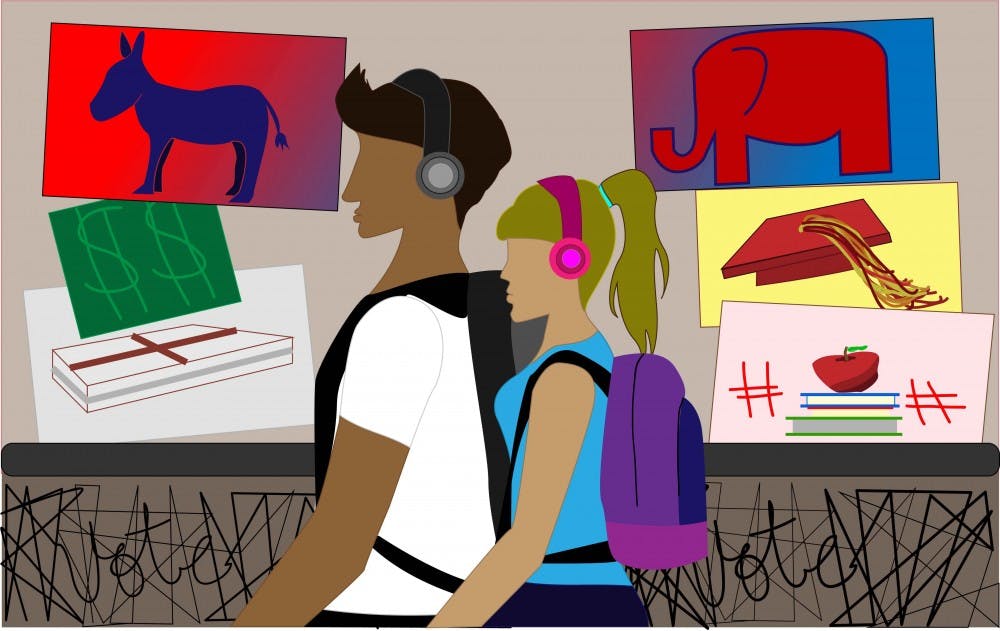Campus political groups are trying to harness the momentum that turned out a record number of students and young people to vote in the midterm elections.
ASU groups from both sides of the political spectrum are seizing the current post-election moment to shift strategies, find new members and encourage students to keep the pressure on their elected politicians.
Rick Thomas, president of ASU College Republicans United and senior studying elementary education, said they are changing their agenda following an election that delivered several surprising victories for Democrats.
"We are shifting from getting people elected to now working to help advocate for policy that gets proposed in the Legislature," he said. "We will be knocking on doors and educating people about what is going on in their government and communities."
Staying educated and informed even in the off-season can be pertinent to keeping the government afloat, said Josh Fixel, aerospace engineering graduate student and president of BridgeASU, a non-partisan organization that gives students the opportunity to share political views.
"If we were all involved and educated about the issues and the officials, we would have a perfectly run government because we'd be electing the right people," he said. "The officials would be doing their jobs because they know they need to be doing so in order to get reelected."
While the election is over, students can stay engaged with what's happening politically in their local government.
"Being informed about our local government and also knowing what's happening in our own backyard is very important and can be very powerful," said Jesse Avalos, president of ASU Young Democrats and senior studying political science.
Juan Mendez, a state senator from Legislative District 26, which encompasses Tempe, said that politicians often rely on the public to tell them how to do their jobs well.
"It would be way too simple if Democracy just ended with the students voting for me, but that's not enough," he said. "I'm your representative – you have to tell me what I should be doing ... to help show me what I should be focusing on."
Social media is an important tool that students can easily utilize to help them stay informed and active in their local politics.
"We have social media, which we can utilize a lot ... you can follow along with your local state representatives and local officials, and they always give constant updates of what's happening in your area, what's happening at the state capitol and beyond," Avalos said.
Other than using social media, Mendez said that the legislature is always open to having students shadow them to see how policy is being made. He also said that when people show up to public meetings, the legislatures take notice.
"Last year was the first time that we had people there all the time, not just for one issue, but just to keep tabs on us to see what we were doing," he said. "That was my sixth year in office, and it was a totally different experience in terms of ... what was done, all because we had people at the legislature watching us."
Mendez also said that the Red for Ed movement highlighted that creating a presence at the Capitol can actually make a difference.
However, Thomas said civility in a time when politics seems more divisive than ever can be challenging.
"Students have a policy of advocating on emotion. They need to look at both sides and educate themselves on both side of the issues," Thomas said. "Democrats and Republicans have the best interests of their people at heart – it's just the differences of how we go about implementing policy that can polarize us at times."
Though this polarization is clear, especially as the Arizona House of Representatives is currently split 31-29 in favor of Republicans, and the State Senate 17-13 in favor of Republicans with the Senate race in LD 28 still outstanding as of Nov. 15. However, keeping an open mind can help both sides get what they want.
"I think it starts with students because we are the future professionals of this country ... we need to really work toward being open minded and understanding of each other," Fixel said. When we talk politics with someone who we don't agree with it, we should be able to at least come to an understanding of what each side believes in."
Correction: In an earlier version of this article, the Arizona Senate makeup was misstated. The change has been made.
Reach the reporter at mlshuman@asu.edu or follow @mackenzieshuman on Twitter.
Like The State Press on Facebook and follow @statepress on Twitter.




